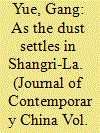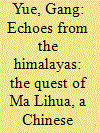| Srl | Item |
| 1 |
ID:
082730


|
|
|
|
|
| Publication |
2008.
|
| Summary/Abstract |
With the English translation of his novel Red Poppies published in 2000, the ethnic Tibetan author Alai has established a prominent presence outside the People's Republic, apart from the Shangri-La myth that has dominated the Western imagination of Tibet. This essay attempts to unpack the multitudes of meaning of the novel, situate it against a material history of opium in Eastern Tibet, and highlight the dilemma of a leading Tibetan author. Through further discussion of his essays unavailable in English, this essay aims at developing a cultural geography of Alai's intellectual travel, energized by a Tibetan warrior tradition in his homeland and yet detailed about contemporary social, cultural, and environmental changes. It paints a picture about a Tibet that is neither a paradise nor a human hell, alive in the moment to survive the creative destruction of Sino-globalization that began long before the People's Liberation Army marched into Lhasa
|
|
|
|
|
|
|
|
|
|
|
|
|
|
|
|
| 2 |
ID:
050325


|
|
|
|
|
| Publication |
Feb 2004.
|
| Summary/Abstract |
A long-time Han resident and a prominent writer in Tibet, Ma Lihua embodies a myriad of contradictions and dilemmas of Han Chinese intellectuals in Tibet. Her deep love of Tibetans and their rich culture coexists with her old-fashioned revolutionary idealism. Her cultural relativism enables her to understand the traditions and conditions of Tibet while her very work is part of the Chinese cultural mission to incorporate Tibet into the nation-state of the PRC. With a view to the political and social environment in which she writes, this essay provides a descriptive and sympathetic reading of her work on modern Tibetan literature and her encounters with, and reflections upon, modern Tibetan society.
|
|
|
|
|
|
|
|
|
|
|
|
|
|
|
|